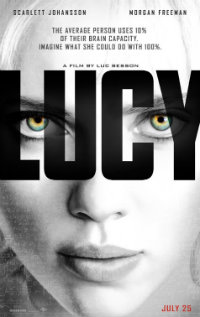In the Sky With Diamonds: Besson’s Latest a Crock of Crack-pot Sci-Fi
 It’s rather a shame to report that Luc Besson’s latest directorial effort, Lucy, is an underwhelming disappointment. A host of intriguing ideas get liquidated by silliness, uncertainty, and rampant narrative contradiction. Sure, at least this film doesn’t generate that kicked-in-the-teeth feeling that his last film, 2013’s The Family so generously employed, but for a film that initially promises to bring us the kind of fetishized ass-kicking females that graced his most notable efforts, like La Femme Nikita and The Fifth Element, its inability to reach this potential is doubly frustrating. Oddly structured and clearly uninterested in employing consistent logic in how increased use of brain capacity eventually leads to super powers, the whole endeavor feels like a half-baked idea carelessly patched together.
It’s rather a shame to report that Luc Besson’s latest directorial effort, Lucy, is an underwhelming disappointment. A host of intriguing ideas get liquidated by silliness, uncertainty, and rampant narrative contradiction. Sure, at least this film doesn’t generate that kicked-in-the-teeth feeling that his last film, 2013’s The Family so generously employed, but for a film that initially promises to bring us the kind of fetishized ass-kicking females that graced his most notable efforts, like La Femme Nikita and The Fifth Element, its inability to reach this potential is doubly frustrating. Oddly structured and clearly uninterested in employing consistent logic in how increased use of brain capacity eventually leads to super powers, the whole endeavor feels like a half-baked idea carelessly patched together.
An American student in Taipei, Lucy (Scarlett Johansson) accidentally becomes embroiled in a complicated drug smuggling ring when her new boyfriend, Richard (Pilou Asbaek of A Hijacking) forcibly requests her help delivering a briefcase full of a new drug called CPH4 to Mr. Jang (Choi Min-sik of Chan-wook’s Oldboy). Lucy is thrust into the violent underworld, forced by Mr. Jang into being a drug mule. But before she can get on a flight, the packet of drugs sewn into her abdomen leaks, changing the structure of her cells to such a degree that she’s able to access a higher percentage of her brain than the general human being. As the effects of the drug boost the percentage to what eventually will be complete capacity, Lucy must seek the assistance of renowned Professor Norman (Morgan Freeman), whose hypotheses about what the human brain is actually capable of makes him a prime candidate for passing on Lucy’s firsthand knowledge. But upon reaching 100% capacity, Lucy is aware that her cells will implode, forcing her to completely leave behind any semblance of humanity. It’s a race against the clock as Mr. Jang struggles to overtake her and reclaim his precious synthetic drug, which mirrors the effect of a hormone produced in minute amounts by a mother’s uterus to make the bones of a fetus grow.
Compared to recent roles of accordant nature, such as her voice work in last year’s Her and the mysterious alien in Jonathan Glazer’s brilliant Under the Skin, it seems Johansson’s following in the footsteps of Saoirse Ronan as a go-to representative for alien/assassin/robotic life forces. The resultant mess of Lucy can’t quite be placed on the shoulders of any of its cast or crew members. The fault lies entirely in Besson’s cockamamie clutter of shiny ideas that never congeal into a satisfactory synthesis.
Too much exposition often transcends into unintentional comedy with Johansson’s titular heroine explaining the mechanics of her situation at every turn. Her predicament, supposedly, explores the notion that basic human instincts and emotions (desire/pain/fear/hunger, etc.), the very aspects of existence that we point to as evidence of our unique superiority are, in fact, roadblocks that limit our potential. This relegates Johansson’s performance to merely that of a fetishized fem-bot. The higher percentage of access to her brain makes her less and less human, which we’re led to believe allows her the power to transmogrify at will, yet finds Lucy clinging to notions of feminine standards of beauty, rockin’ those Louboutins and a slinky black dress right up to the grand finale.
Beginning as a sort of sleazy, more invasive drug mule narrative that’s sure to remind many of Maria Full of Grace (2004), Besson oddly attempts to overlay hyperkinetic CGI visuals of internal human anatomy as directly affected by CPH4, which takes the place of any kind of onscreen action. We’re almost thankful for a frantic car chase sequence toward the end of the film, some kind of distraction from the glaring lack of logic applied to a scenario that can never seem to define its parameters.
Choi Min-sik gets stuck playing a flavorless baddy (should we be confused or irritated that the South Korean star gets passed off as Chinese?) while Freeman is the grandfatherly essence of wisdom, left behind to guide us through Lucy’s adaptation into a Transcendence (2014) themed state of existence. Besson’s most plagiaristic flourish concerns a Tree of Life (2011) sequence that finds Lucy, from the comfort of a swivel chair, rewinding through time to the beginning of existence, confronting the life form considered to be the first woman (whose skeleton was named Lucy), replete with dinosaurs.
To refer to Besson’s Lucy as a missed opportunity would be misleading, as this requires a complete re-working for its basic premise to be anything more than fantastically nonsensical. Looking back on Besson’s filmography, Lucy doesn’t hold a candle to the iconic, male-based fantasy land composites of Nikita or Lulu, but she’s a wan reflection of the type of excitable mash-ups he used to be capable of.
★½/☆☆☆☆☆


